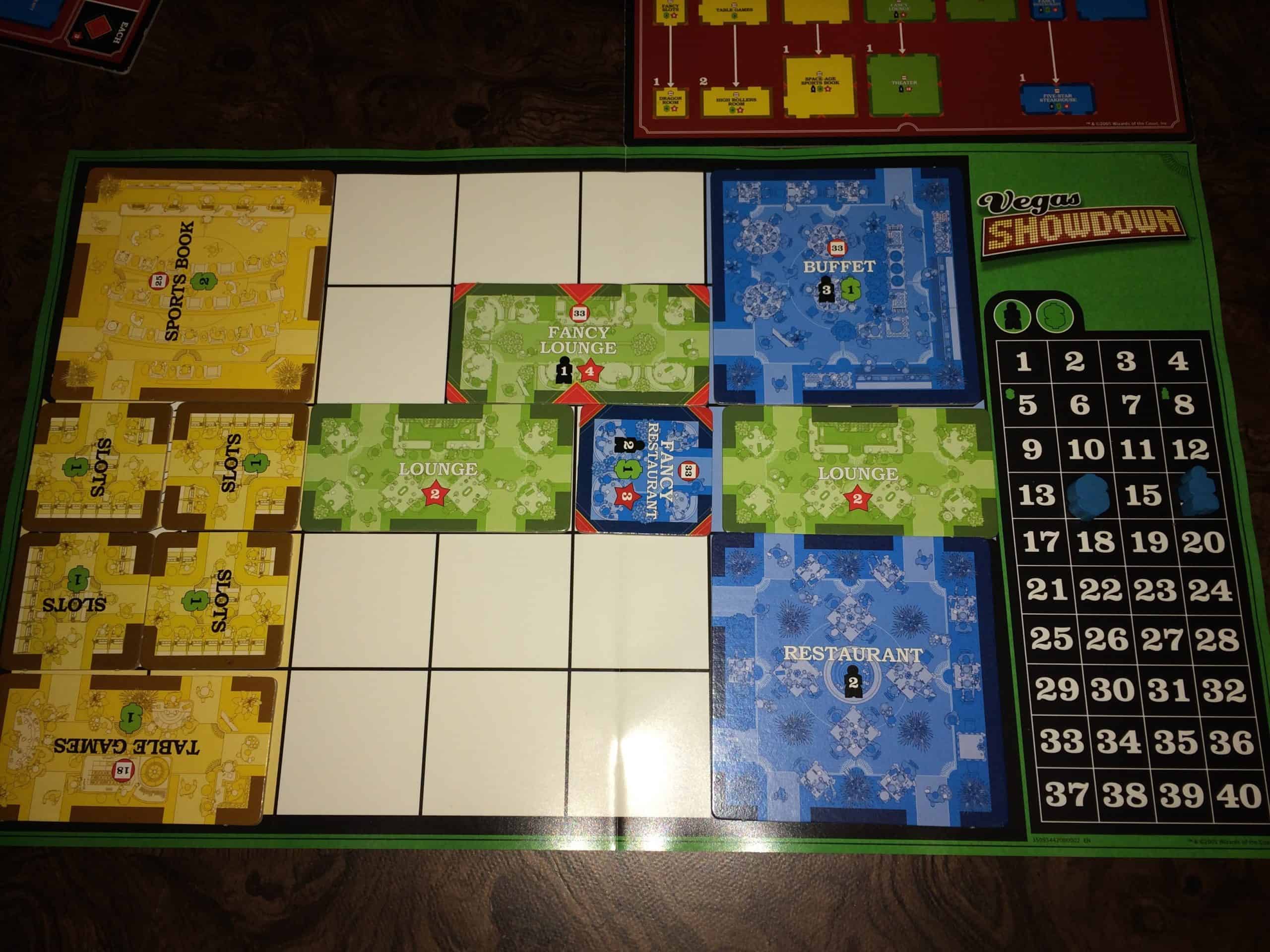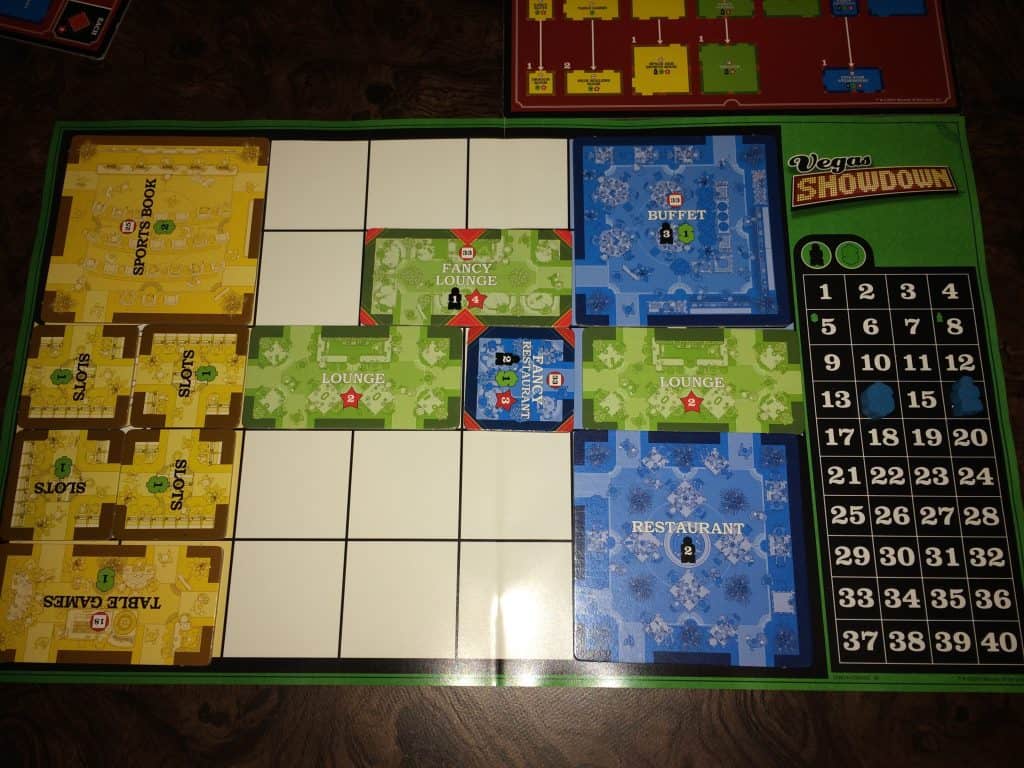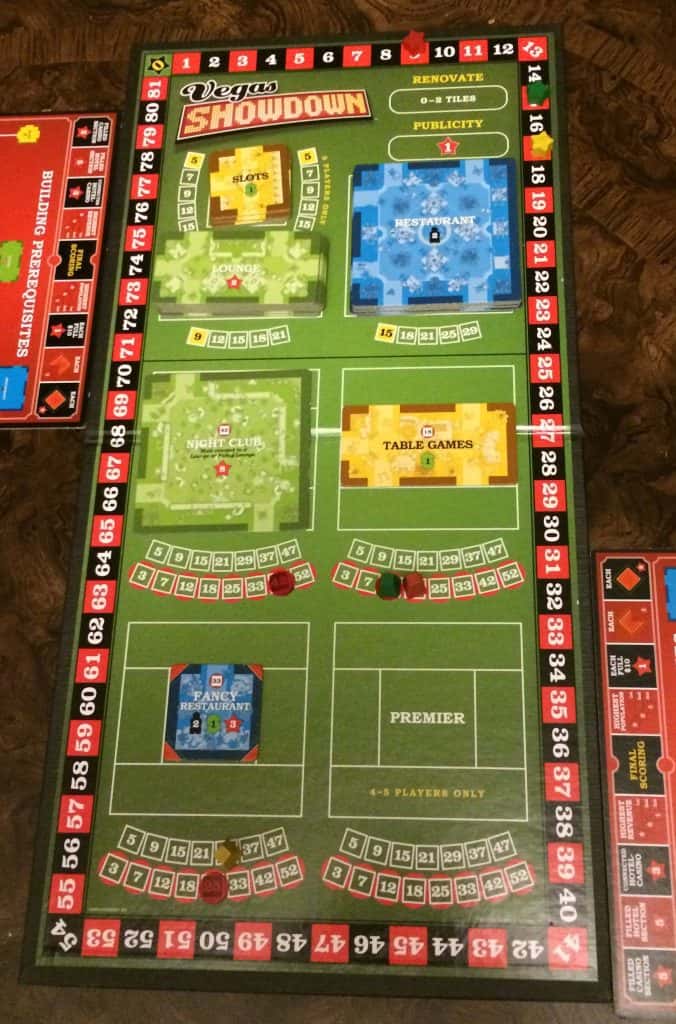
The title of this article is hyperbole. I can’t see into the future so there’s no way for me to be certain that there won’t someday be a Vegas Showdown in Space or Ninja Dinosaur Vegas Showdown that could be a tiny bit more awesome. It’s possible that some may not agree with my esteem for this game due to unfamiliarity, contrarian lifestyle or a hatred of fun. I can’t do anything about the last two, but I will briefly explain the workings of the game for those who haven’t played it and then discuss what makes it great.
NEW IN TOWN?
Each player is a multi-millionaire competing to build the best hotel-casino. Players bid against each other to obtain room tiles from a changing market. The tiles provide revenue, population and fame benefits when added to the player’s hotel-casino mat and must comply with certain placement restrictions. Fame earned during the game is added to end game rewards derived from money on hand, having the most revenue or population and bonuses for certain tile arrangements.
MY CASINO, MY RULES
I love when a game lets you build your own creation. I may win, I may lose, but I still have a feeling of accomplishment at the end of a game when I’m looking at my empire, dungeon, city or casino laid out before me. In Vegas Showdown while other players may prevent you from getting the tiles you want, you and only you decide how to lay out the slot machines, buffets, table games and night clubs you add to your mat. When I play I feel ownership over my virtual hotel-casino, to the point that I feel concerned about non-scoring details like not requiring patrons to walk through the buffet to get to the five-star steakhouse.

The danger of giving players their own kingdom to build is that the play experience can end up being multi-player solitaire, but player interaction isn’t an issue in Vegas Showdown.
A FOOL AND HIS MONEY…
Interaction in Vegas Showdown comes in the form of bidding for tiles. There is a supply of basic tiles (slots, lounge, restaurant) plus a few randomly drawn premier tiles to bid on each round. On your turn you place your single bid marker on the tile you desire and if someone later bids more you must beat the current bid, move to another tile or bow out. The auction ends when there is no more than one bidder on each tile. It’s a quick and easy system and for the basic tiles it’s a relatively simple matter of not bidding more than the tile is worth since you can try again next round.

For the premier tiles, however, there’s another twist – they enter the game with a minimum bid amount which is reduced each round if they are not purchased. The Fancy Restaurant I need is too pricey at its initial minimum bid of $33, but if I wait a round or two for it drop to $25 or $18 I will probably encounter competition and may end up in a bidding war that drives the price back up. Despite the simplicity of these bidding mechanics there’s ample opportunity for swear inducing interplay as players bluff and compete to get the tiles they want.
WHAT PRICE FAME?
Tiles provide you with some amount of population, revenue and/or fame. Fame is the currency that wins you the game, but if you focus on fame and disregard income in the early game you will get outbid for the tiles you want. Your income each turn is equal to the lowest of your revenue and population, and few tiles have both. So while you’re balancing population and revenue to maximize your income you need to make sure you don’t switch your attention too late from income to fame. This balancing act is further complicated by your opponents outbidding you for the tiles that would keep your world in perfect harmony.
FORTUNATELY IT’S NOT LIKE THE RULES CAN CHANGE EVERY TURN. OH WAIT…
BEST LAID PLANS…
When there is an open premier tile space because of a previous purchase an event card is drawn to determine what type of tile to add to the market. In addition to indicating the tile type the event card specifies some opportunity or change in procedure to be followed. This can range from offering a one time chance to purchase fame points or rewarding players with fame for having certain types of tiles in their hotel-casino, to a slot-builders strike which removes the ability to bid on slots tiles for a turn.
In some games random event cards create nothing but frustration and misery. They can have effects that destroy long-term strategy and make the players’ decisions seem less consequential. Vegas Showdown is more of a tactical game since the order that premier tiles appear is predominantly random and the bidding mechanic can easily cause you to adjust your plans, so players are unlikely to have a grand, game-long strategy. Furthermore the effects of the event cards are either instantaneous or for the length of the turn and do not seem overpowered in their consequences.
IT WAS FUN WHILE IT LASTED
You can dissect mechanics and discuss their relative merits and failings but sometimes an admirable game just isn’t fun. Vegas Showdown is fun. Bidding provides player interactivity, tile laying provides personal investment, and balancing resources (money, fame, population and revenue) provides depth. All this with rules that are easy to teach and a play time that doesn’t overstay its welcome.
Originally published in 2005 by Avalon Hill/Wizards of the Coast/Hasbro, Vegas Showdown could be hard to find until a second edition was released in 2012 making it generally available once more.








